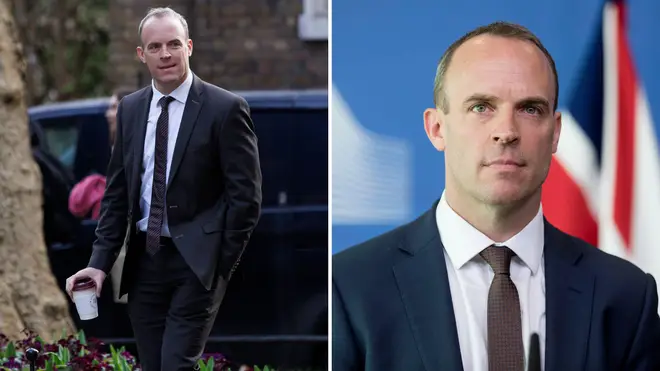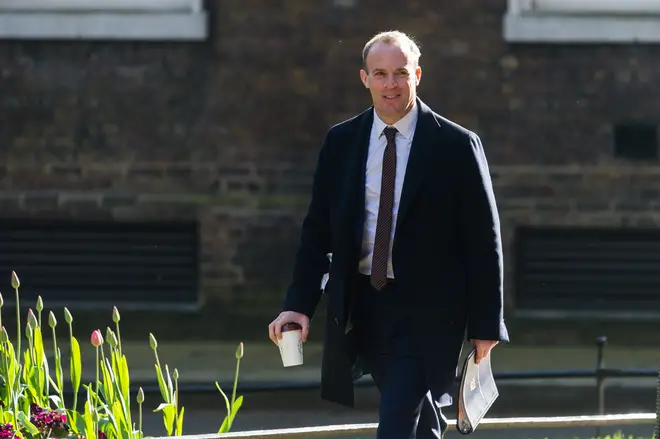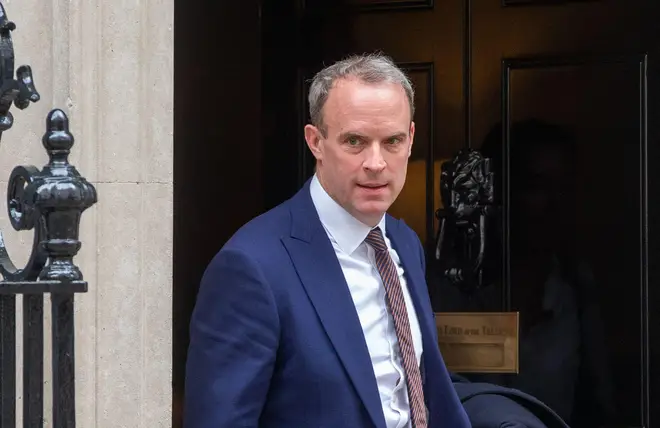
Richard Spurr 1am - 4am
23 April 2023, 06:57 | Updated: 23 April 2023, 07:05

Dominic Raab has continued to defend his conduct after resigning from his positions as justice secretary and deputy prime minister, saying he left office with his "head held high".
The former government secretary has continued to hit out at civil servants, who he claims were "activists" with an agenda against Brexit and reforming human rights laws.
Mr Raab added that his integrity remains "intact" after his resignation.
"There was Brexit, I was driving human rights reform, all of these things are counterintuitive to the culture of the civil service," he told the Mail on Sunday.
"A vast majority were faithful, professional, loyal, excellent, behaved with all the professionalism that you'd expect. But I didn't take no for an answer.
"Adam Tolley found that I'd never once lost my temper with anyone, I'd never shouted at anyone, I'd never sworn at anyone [but] I think it was my persistence and perseverance which ultimately precipitated these claims."
A report into Mr Raab's behaviour upheld two allegations against Mr Raab, with eight levied towards him in total.

It comes after a warning that Rishi Sunak and Mr Raab's response to the report on bullying will make future civil service complaints more difficult.
Hannah White, director of the Institute for Government (IfG), said "no civil servant would feel encouraged to speak out in future".
She called the episode a missed opportunity for Mr Sunak to reinforce standards.
It comes after Adam Tolley KC's investigation into allegations of bullying concluded Mr Raab engaged in an "abuse or misuse of power" that "undermines or humiliates" during his time in the foreign office .
It has been claimed that Mr Raab's time in government was ended by an argument about Spanish troops being stationed permanently in Gibraltar, after the British ambassador to Spain allegedly went beyond what he had been authorised to offer.
Mr Raab - foreign secretary at the time - heard Spain was complaining about the UK changing its position on negotiations about keeping the land border open with Gibraltar.
The British stance had always been that no Spanish troops would ever be stationed permanently in Gibraltar.
Read More: Key findings from the Dominic Raab bullying report
Read More: Read in full: Dominic Raab's furious resignation letter to the prime minister
Perplexed at Spain's complaints, Mr Raab investigated and heard that the ambassador to Spain, Hugh Elliott, may have gone beyond the official position agreed by the Cabinet and offered to have Spanish 'boots on the ground' permanently.
The minister then ordered Mr Elliott back from Spain to London to give an account of his actions. But his explanations were not specific enough, according to supporters of Mr Raab, the Telegraph reported.
Mr Raab replaced Mr Elliott in negotiations with the former ambassador Simon Manley, although Mr Elliott remained the top British diplomat in Spain.
My resignation statement.👇 pic.twitter.com/DLjBfChlFq
— Dominic Raab (@DominicRaab) April 21, 2023
Mr Raab hit out at "activist" and "passive-aggressive" civil servants on Friday, who he claimed were trying to block the government's agenda.
The former justice secretary said there was a "very small minority of very activist civil servants" who are against some reforms, and who are "effectively trying to block government".
Read More: Dominic Raab resigns: How bullying allegations against ex-deputy PM and justice secretary unfolded
Mr Raab told the BBC: "That's not on. That's not democratic." He added that civil servants acting in this "passive-aggressive way" meant that the "government can't deliver for the British people".
Adam Tolley KC's independent probe - which covered several claims since 2018 cleared Mr Raab of several allegations, including findings that he did not swear.
But it found he was "intimidating" in the context of a work meeting. It also found that civil servants had "no ulterior agenda".

"It also involved an abuse or misuse of power in a way that undermines or humiliates. He introduced an unwarranted punitive element," the report said.
It added that while meeting policy officials, Mr Raab "acted in a manner which was intimidating, in the sense of going further than was necessary or appropriate in delivering critical feedback, and also insulting, in the sense of making unconstructive critical comments about the quality of work done (whether or not as a matter of substance any criticism was justified)".
He found Mr Raab "complained about the absence of what he referred to as 'basic information' or 'the basics', about 'obstructiveness' on the part of officials whom he perceived to be resistant to his policies, and described some work as 'utterly useless' and 'woeful'".
Mr Tolley said he conveyed a threat to a civil servant by referencing the Civil Service code of conduct that had "a significant adverse effect on a particular individual who took it seriously" during his time as foreign secretary.
"The DPM's conduct was a form of intimidating behaviour, in the sense of conveying a threat of unspecified disciplinary action, and was experienced as such," he wrote.
"He did not target any individual, nor intend to threaten anyone with disciplinary action. However, he ought to have realised that his reference to the Civil Service Code could well have been understood as a threat."
Mr Tolley praised the officials for coming forward and found they had "no ulterior agenda".

James O'Brien and Andrew Marr discuss Raab's resignation
The report said Mr Raab described his style as "inquisitorial, direct, impatient and fastidious", and that he typically works from 7.30am to 10pm Monday to Thursday.
It said Mr Raab believed once a decision on policy is taken, it should not be revisited by civil servants.
But he was cleared of making physical gestures in a threatening way, with Mr Tolley writing that the most extreme claim given was him putting his hand out to a person's face to stop them talking.
He also cleared Mr Raab of shouting and swearing at staff, saying he "did not swear at any individual or swear more generally".
He was also unable to find in favour of Ministry of Justice civil servants who complained of a "perverse culture of fear" and unreasonable work deadlines.
The Prime Minister's official spokesman said in the wake of Mr Raab's resignation and article: "You can see the aspects relevant to the code are set out in the report. I think those speak for themselves.
"The Prime Minister thinks it's right that any findings whatsoever that are deemed to be bullying, it's right to resign. That's the commitment the former secretary of state made and he's upheld that commitment."
He added: "Clearly, any bullying in general terms is unacceptable and there are clear rules that apply to that."
Dave Penman, the head of the FDA union that represents senior Whitehall employees, said the inquiry was a "damning indictment of the inadequacy of a process that relies solely on the Prime Minister of the day to enforce standards".
His union says one in six senior civil servants have seen misconduct take place in the last year.
"This demonstrates that Raab is not just one bad apple, and there is a wider problem with ministerial bullying than the Prime Minister wants to admit," Mr Penman added said.